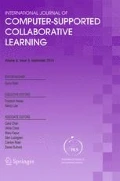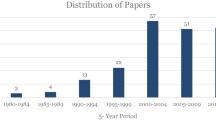Abstract
This paper analyses preconditions for trust in virtual learning environments. The concept of trust is discussed with reference to cases reporting trust in cyberspace and through a philosophical clarification holding that trust in the form of self-surrender is a common characteristic of all human co-existence. In virtual learning environments, self-surrender might fail, due to a setting that affords strategic communication and impression management. To obtain the kind of unconditional commitment necessary for learning, one might benefit from the insights from open-source communities, in which self-articulation of goals and volunteerism promote productivity. Balancing free will in connection with study initiatives with inquiry teaching methods might encourage a practice which favours mastery-oriented learning strategies and the seeking of knowledge for its own sake.
Similar content being viewed by others
References
Arendt, H. (1973). Remarks by Hannah Arendt, Advisory Council, Princeton University, Princeton.
Aristotle, transl. by L. H. G. Greenwood (1909). Nicomachean ethics. Cambridge: University Press.
Barnett, R. (2007). A will to learn: Being a student in an age of uncertainty. Buckingham: Society for Research in Higher Education and Open University Press.
Benkler, Y., & Nissenbaum, H. (2006). Commons-based peer production and virtue. The Journal of Political Philosophy, 14(4), 394–419.
de Laat, P. B. (2005). Trusting virtual trust. Ethics and Information Technology, 7, 167–180.
Dillenbourg, P. (1999). Introduction: What do you mean by “collaborative learning”? In P. Dillenbourg (Ed.), Collaborative learning—cognitive and computational approaches (pp. 1–19). New York: Elsevier Science.
Fontaine, G. (2002). Presence in “Teleland”. In K. Rudestam & J. Schoenholtz-Read (Eds.), A handbook on teaching in the virtual classroom: A guide to excellence in online education (pp. 29–53). Thousand Oaks: Sage.
Gadamer, H. G. (1993). Truth and method. London: Sheed & Ward.
Goffman, E. (1959). The presentation of self in everyday life. New York: Anchor.
Jarvenpaa, S. L., & Leidner, D. E. (1999). Communication and trust in global virtual teams. Organization Science, 10(6), 791–815.
Kirschner, P., Strijbos, J.-W., Kreijns, K., & Beers, P. J. (2004). Designing electronic collaborative learning environments. Educational Technology Research & Development, 52(3), 47–56.
Kling, R., & Courtright, C. (2004). Group behaviour and learning in electronic formus: A socio-technical approach. In S. A. Barab, R. Kling, & J. H. Gray (Eds.), Designing for virtual communities in the service of learning (pp. 91–120). Cambridge: Cambridge University Press.
Land, R., & Bayne, S. (2005). Screen or monitor? Issues of surveillance and disciplinary power in online learning environments. In R. Land & S. Bayne (Eds.), Education in cyberspace (pp. 165–179). New York: RoutledgeFalmer.
Levey, M. D. (2007). No time to think: Reflections on information technology and contemplative scholarship. Ethics and Information Technology, 9, 237–249.
Luhmann, N. (1979). Trust and power: Two works. Chichester: Wiley.
Løgstrup, K. E. (1997). The ethical demand. Notre Dame: University of Notre Dame Press.
MacIntyre, A. (1999). After virtue. London: Duckworth.
Pettit, P. (2004). Trust, reliance and the Internet. Analyse und Kritik, 26, 108–121.
Platon, transl. with notes by C. C. W. Taylor (1991). Protagoras. Oxford: Clarendon.
Salmon, G. (2005). E-tivities: The key to active online learning. London: Taylor and Francis.
Sherry, L. (2000). The nature and purpose of online conversations: A brief synthesis of current research. International Journal of Educational Telecommunications, 6(1), 19–52.
Sorensen, E. (2002). Distributed CSCL—a situated, collaborative tapestry. In L. Dircknick-Holmfeld & B. Fibiger (Eds.), Learning in virtual environments (pp. 165–192). Gylling: Samfundslitteratur.
Author information
Authors and Affiliations
Corresponding author
Rights and permissions
About this article
Cite this article
Gerdes, A. Revealing preconditions for trustful collaboration in CSCL. Computer Supported Learning 5, 345–353 (2010). https://doi.org/10.1007/s11412-010-9090-8
Received:
Accepted:
Published:
Issue Date:
DOI: https://doi.org/10.1007/s11412-010-9090-8




